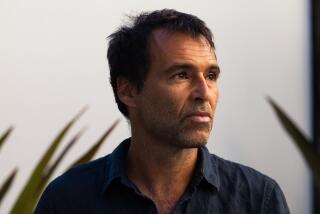Out of Africa, Some Double-Time Dance Appeal
- Share via
Think of the musical heydays of cities like Memphis, Chicago and New Orleans, times when the stars aligned and the sounds just seemed to rise, organically, like weeds from the cracks in the sidewalks.
In the early 1970s, Kinshasa, Zaire, was blessed by such a confluence. Franco and Tabu Ley Rochereau were like twin gods over a club scene that was bursting with young bands, double-timing the distinctive Central African version of rumba and turning it into something new called soukous.
Samba Mapangala was just a teenager then, with a sweet voice that put him more in the camp of the silky Rochereau than with the rootsier Franco. Mapangala left his home in Matadi and landed in Kinshasa’s heady scene.
“People say, ‘You have a good voice. You can sing like Tabu Ley,’ ” Mapangala--who performs tonight at the Long Beach Museum of Art--said on the phone recently, remembering his decision to try his luck in music. “I am a fan of Tabu Ley. I follow him. It is him who made me a musician.”
There were “many young bands,” Mapangala continued, “many young stars” in Kinshasa, Zaire’s riverside capital. Mapangala founded a group called Les Kinois. “That time, Zairean music was good, because we were many groups. Competition was high and good. We were competing because we were young, we liked it.”
But the center was not to hold. Musicians began to leave Zaire for economic and political reasons. Many of Mapangala’s generation headed for Paris’ recording studios and burgeoning expatriate scene (Rochereau stayed in Zaire through much of the ‘80s but lives now in Anaheim, of all places).
Mapangala struck a path east, arriving first in Uganda in 1975 and finally settling in Nairobi, Kenya, in 1977. He forged a distinctive direction for his music, too. The Paris-Zairian mob pushed for faster and faster dance rhythms, eventually all but eliminating the slower, melodic openings that had characterized early soukous songs. Mapangala eventually adopted elements of the less-frenetic benga style, popular in his new Kenya home.
“I [wasn’t] liking [the newer] soukous, which start right away with guitars, ba ba ba.”
He had brought Les Kinois to Kenya with him, but the band dissolved, so he formed Orchestre Virunga (named for a volcano in eastern Zaire), which remains with him today. There have been problems through the years: immigration snafus, lineup changes and a terrifying incident when Ugandan soldiers mistakenly fired on the group, wounding several members.
But through it all, Mapangala has built a solid following not only in Kenya but throughout much of eastern and southern Africa. His current band lineup reflects that pan-African appeal, with members from Zaire, Tanzania and Uganda in addition to Kenya.
Mapangala has been trying to extend his reach beyond the continent as well with a handful of albums, including “Virunga Volcano” on the Earthworks label, that have been released internationally. He toured Europe for the first time four years ago; his first tour of the U.S. came a year later.
His current tour, a two-month trip that started in New Jersey, finds him traveling with four of his regular musicians (two sax players and two guitarists); additional African musicians are being hired for the concerts.
The horns and guitars blend to dominate Orchestre Virunga’s sound (as opposed to the guitars-only focus of much Paris-based soukous). The vocals are pure and melodic (indeed recalling Rochereau), and the songs, exemplified by Mapangala’s biggest hit, “Malako,” are eminently danceable.
Because of the sorry state of Kenya’s studios, Mapangala has made many of his recordings in Paris--using, for economic reasons, mostly Paris-based musicians. He laments that the records don’t capture the feel of his music, and he hopes the current tour might lead to a chance to record in the U.S. with some of his own musicians and locally based players of his own choosing.
Still, as “The Rough Guide to World Music” notes, “one of the appealing things about Mapangala is that he doesn’t sound just like every other Parisian soukous star.”
* Samba Mapangala and Orchestre Virunga play tonight at 7 at the Long Beach Museum of Art, 2300 E. Ocean Blvd. $8-$11. (310) 439-2119.


